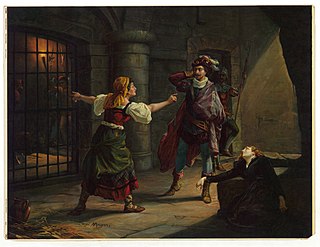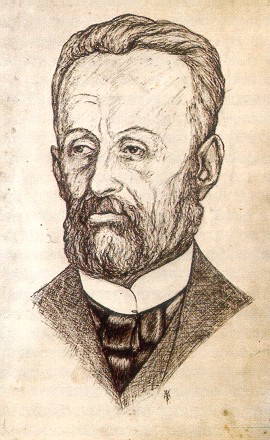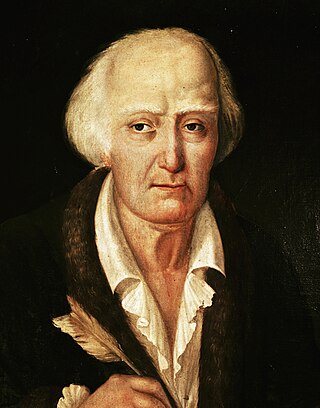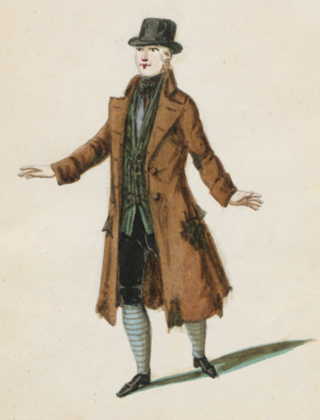
Il trovatore is an opera in four acts by Giuseppe Verdi to an Italian libretto largely written by Salvadore Cammarano, based on the Spanish play El trovador (1836) by Antonio García Gutiérrez. It was García Gutiérrez's most successful play, one which Verdi scholar Julian Budden describes as "a high flown, sprawling melodrama flamboyantly defiant of the Aristotelian unities, packed with all manner of fantastic and bizarre incident."

Abu Abdallah Muhammad XII, known in Europe as Boabdil, was the 22nd and last Nasrid ruler of the Emirate of Granada in Iberia.

Giuseppe Felice Romani was an Italian poet and scholar of literature and mythology who wrote many librettos for the opera composers Donizetti and Bellini. Romani was considered the finest Italian librettist between Metastasio and Boito.

Giuseppe Gazzaniga was a member of the Neapolitan school of opera composers. He composed fifty-one operas, particularly opera buffa.

Pavlos Carrer was a Greek composer, one of the leaders of the Ionian art music school and the first to create national operas and national songs on Greek plots, Greek librettos and verses, as well as melodies inspired by the folk and the urban popular musical tradition of modern Greece.

Lauro Rossi, was an Italian composer, particularly of operas. There is no known connection with Luigi Rossi (1597–1653).

Aureliano in Palmira is an operatic dramma serio in two acts written by Gioachino Rossini to an Italian libretto in which the librettist was credited only by the initials "G. F. R." The libretto has generally been attributed to Felice Romani, but sometimes to the otherwise unknown Gian Francesco Romanelli. It has been suggested that the latter name may have resulted from a confusion of Romani with Luigi Romanelli, La Scala's house poet prior to Romani's appointment to the post.

The Granada War, also called Spanish Christian–Muslim War of 1481–1492, was a series of military campaigns between 1481 and 1492 during the reign of the Catholic Monarchs, Isabella I of Castile and Ferdinand II of Aragon, against the Nasrid dynasty's Emirate of Granada. It ended with the defeat of Granada and its annexation by Castile, ending the last remnant of Islamic rule on the Iberian peninsula.

Giacomo Domenico Mario Antonio Pasquale Giuseppe Di Tritto was an Italian composer, known primarily for his fifty-four operas. He was born in Altamura, and studied in Naples; among his teachers were Nicola Fago, Girolamo Abos, and Pasquale Cafaro. Amongst his pupils were the young Vincenzo Bellini around 1821, plus Ferdinando Orlandi. He died in Naples.
La Lodoiska is an opera in three acts by Simon Mayr to an Italian libretto by Francesco Gonella De Ferrari. It was Mayr's second opera and premiered at La Fenice in Venice on 26 January 1796.

Maria Spezia-Aldighieri (1828–1907) was an Italian operatic soprano who had an active international career from 1849 up into the 1870s. She excelled in the coloratura soprano repertoire and was particularly admired for her portrayals in the operas of Giuseppe Verdi. Her performance of Violetta in Verdi's La traviata at the Teatro San Benedetto in Venice in 1854 is credited with popularizing the opera after it had initially flopped at its premiere in 1853. She was married to baritone Gottardo Aldighieri and is the great grandmother of singer George Aaron.

Lodovico Graziani was an Italian operatic tenor. According to John Warrack and Ewan West, writing in The Oxford Dictionary of Opera: "His voice was clear and vibrant, but he lacked dramatic gifts." He is now mainly remembered for having created the role of Alfredo Germont in the world premiere of Giuseppe Verdi's La traviata in 1853.
Luigi Mosca was an Italian composer of operas and sacred music and a noted singing teacher. He composed eighteen operas, most of which were originally for theatres in Naples, but played throughout Italy in their day.

Leila; or, The Siege of Granada is a historical romance novel by Edward Bulwer-Lytton published in 1838.

Carlo Negrini was an Italian spinto tenor and creator of Gabriele Adorno in Verdi’s opera Simon Boccanegra.

Isabella d'Aspeno is an opera in three acts composed by Pavlos Carrer. The author of its Italian-language libretto is credited only with the initials "R.G.S.". The opera premiered at the Teatro San Giacomo in Corfu on 7 February 1854. The following year, the opera had its Italian premiere at Milan's Teatro Carcano where it achieved considerable success with multiple performances over two seasons. Set in Westphalia during the 14th Century, the plot of Isabella d'Aspeno bears several thematic similarities to Verdi's later opera, Un ballo in maschera. Both involve the assassination of a sovereign by his political and romantic rival during a masquerade ball.
Giovanni Filippo Apolloni was an Italian poet and librettist. Born in Arezzo, he has sometimes been referred to as "Giovanni Apollonio Apolloni", but the second given name is spurious. He served as the court poet to Ferdinand Charles, Archduke of Austria at Innsbruck form 1653 until 1659. On his return to Italy he entered the service of Cardinal Volumnio Bandinelli. After Bandinelli's death in 1667 Appolloni was in the service of the Chigi family in Rome and Siena for the rest of his life. He wrote the librettos for a number of operas, the most well-known of which were Antonio Cesti's L'Argia and La Dori, as well as several oratorios and the texts for cantatas by both Cesti and Alessandro Stradella.
Giuseppe Balducci was an Italian composer, primarily of operas. Born in Iesi, he spent most of his career in Naples and was one of the originators of the "salon opera" genre, the forerunner of chamber opera.

Don Checco is an opera in two acts composed by Nicola De Giosa to a libretto by Almerindo Spadetta. It premiered on 11 July 1850 at the Teatro Nuovo in Naples. Don Checco was De Giosa's masterpiece and one of the last great successes in the history of Neapolitan opera buffa.













